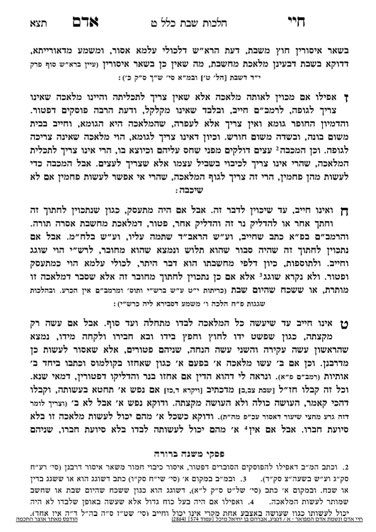We are continuing in siman 8, discussing the concept of misaseik. We need to discuss misaseik within the context of maaseh Shabbos. If a person performs melacha on Shabbos, Chazal place certain limitations on whether the outcome of the melacha can be enjoyed on Shabbos. One opinion in the Gemara is that maaseh Shabbos performed b’meizid is assur mideoraysa and cannot be enjoyed on Shabbos. We do not pasken in accordance with that opinion; we hold maaseh Shabbos is an issur derabanan.
We differentiate in halacha between maaseh Shabbos committed b’shogeig and b’meizid. However, according to the Shulchan Aruch, both maaseh Shabbos committed b’shogeig and b’meizid are assur on Shabbos itself. The Shulchan Aruch understands that maaseh Shabbos b’shogeig is assur on Shabbos as well out of concern that if it is permitted to benefit from on Shabbos itself, one will derive benefit from maaseh Shabbos performed b’meizid as well, or will perform the melacha b’meizid and claim it was b’shogeig. We will learn more about this point at the end of the Klal.
According to the Shulchan Aruch, that maaseh Shabbos b’shogeig is assur to benefit from on Shabbos, we have to discuss a case of misaseik. Shogeig is a stronger level of aveirah than misaseik, in that there is an element of carelessness to a shogeig, as opposed to the honest mistake of a misaseik.
If we understand that misaseik is inherently assur on a Torah level, just that there is no chiyuv to bring a korban, it should follow the same rules as a shogeig. If we understand that misaseik is only assur miderabanan, it would be akin to benefitting from maaseh Shabbos of something which is assur miderabanan.
The Gra writes that there is an opinion in the Gemara which holds that generally speaking, Chazal did not enact any prohibition against benefitting from maaseh Shabbos done b’shogeig on Shabbos itself, and he paskens like that shitah. The Mishnah Berurah writes that one can rely on the Gra regarding an issur deoraysa in a case of significant need, and can also rely on the Gra for an issur derabanan.
Thus, if we argue that misaseik is only assur miderabanan, it would be muttar to benefit from the maaseh Shabbos on Shabbos itself. If it is assur mideoraysa, we would be machmir lechatchilla, in accordance with the Shulchan Aruch, and one could rely on the Gra in cases of significant need. We will continue to clarify this issue in the next shiur.
Summary
- Assuming that misaseik is assur miderabanan, it is muttar to benefit from the maaseh Shabbos of the misaseik action on Shabbos itself.



